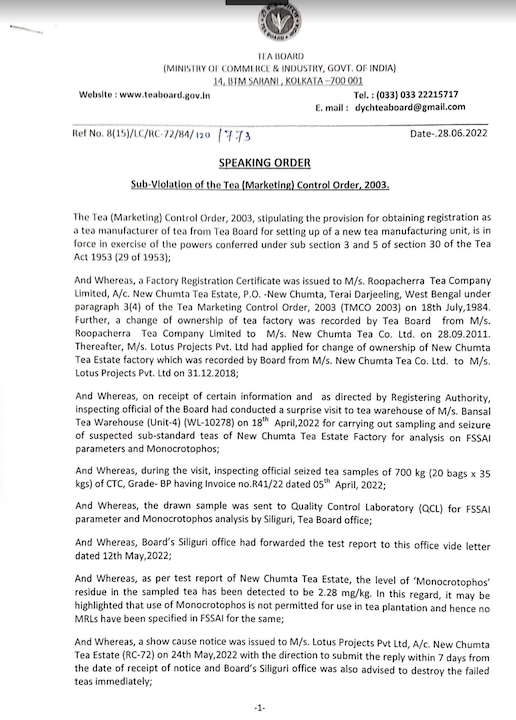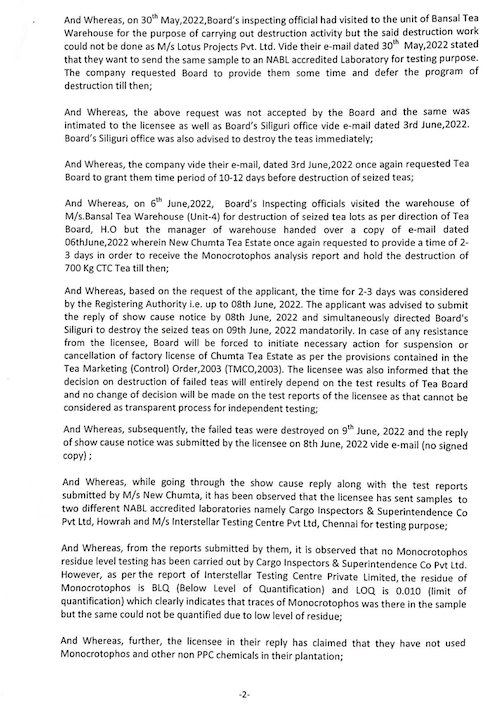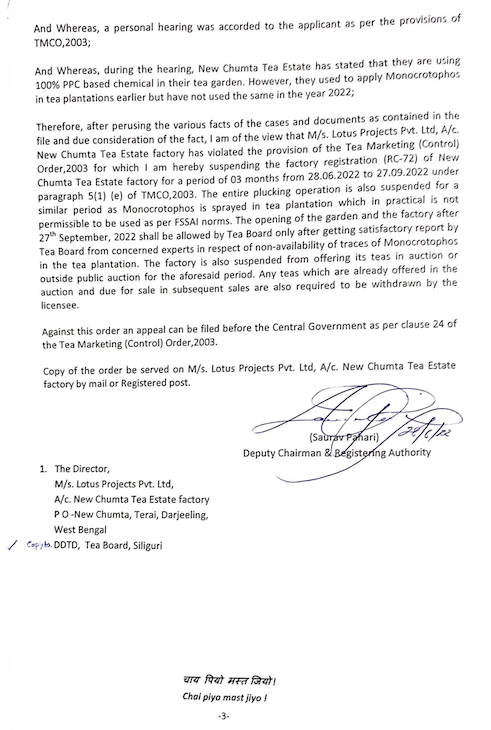Alarmed at developments in global markets that some of the tea consignment exported from India contain high chemicals, the Kolkata-based Tea Board has cracked the whip.
The Tea Board, which functions under the Ministry of Commerce, recently sent out its men to take samples from various tea gardens across India and, subsequently, has banned a top tea estate in Terai, Darjeeling district for using chemicals that can cause cancer.
Documents received by this reporter showed that operations at the Chumta Tea Estate has been suspended by the Tea Board for a period of three months, nearly 700 kg of tea destroyed because it contained high levels of Monocrotophos, not permitted for use in tea plantations by Food & Safety Standards Authority in India (FSSAI). Hence, Chumta Tea Estate was found violating the Tea Marketing Controlling Order, issued by the Commerce Ministry way back in 2003.
Documents accessed by this reporter show that the Tea Board officials conducted a sudden raid at Bansal Teas Warehouse on April 18, 2022 for carrying out sampling and seizure of suspected sub-standard tea for analysis on FSSAI parameters. And then, the samples were sent to the Quality Control Laboratory (QCL) for analysis.
“As per test report of New Chumta Tea Estate, the level of ‘Monocrotophos’ residue in the sampled tea has been detected to be 2.28 mg/kg. In this regard, it may be highlighted that use of Monocrotophos is not permitted for use in tea plantations and hence no MRLs have been specified in FSSAI for the same,” said the note by Tea Board. This reporter has a copy of the note.1
Top officials of the Chumta Tea Estate have been summoned by the Ministry for a hearing today, July 12, 2022. Chumta Tea Estate owner, Dilip Aggarwal, who also owns Sourenee Tea Estate in Darjeeling, is expected to attend the meeting. The decision taken by the Ministry officials could have far reaching implications for the Chumta Tea Estate.
What is interesting is that this is the first violation detected by officials of the Tea Board. As more results of these surprise tests reach the Tea Board, there are chances that some more gardens could come under the Board’s radar.
Planters in Darjeeling – home to some of India’s finest tea gardens – say it is time that the gardens turn organic.
If that is sorted out, Indian tea can create the perfect storm in the world market.
India, the world’s second-largest producer, needs to send a strong signal to the global market.
Currently, it does not have the largest slice of the global pie. It is ranked fourth. Kenya leads the pack with 28 percent export of its produce, followed by China, the world’s largest producer (19 percent), then Sri Lanka (14 percent) and India (11 percent).
The Kolkata-based Tea Board is trying hard to push the Commerce Ministry to hold nation-to-nation talks to market Indian tea.
Planters across India know that tea – also considered a health product – is not just a widely loved beverage, it is a state of mind for millions of Indians. The Tea Board is working hard to connect planters in India with high-end buyers across the world, especially in Australia and South America.
And the presence of pesticides and chemicals beyond permissible limits could send a very wrong signal.
India exports its crush-tear-curl (CTC) grade mainly to Egypt and Britain, with the orthodox variety going to Iraq, Iran and Russia.
New generation planters have already labelled tea as the best option in the $1.5 trillion wellness segment. In fact, the planters in Darjeeling are lobbying hard to bring fusion tea under the Ministry of Ayush. If that works, Darjeeling tea, and its sizable section of fusion tea, could get a slice of the Rs 3,000 crore-plus Ayush budget.
All eyes on the meeting in the Indian Capital.
(Shantanu Guha Ray is a Wharton-trained journalist and award-winning author. He lives in Delhi with his wife and two pets. He won the 2018 Crossword award for his book, Target, which probed the NSEL payment crisis.)





